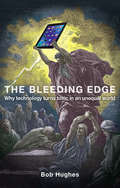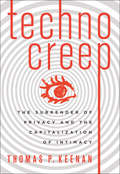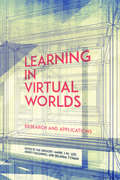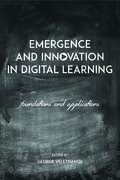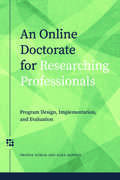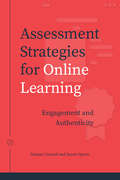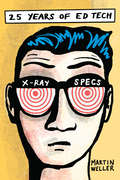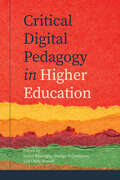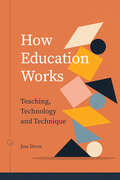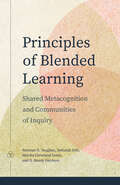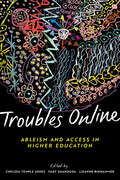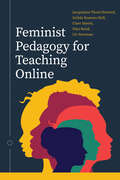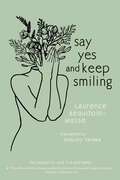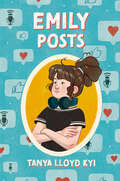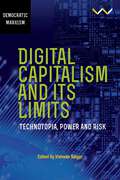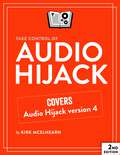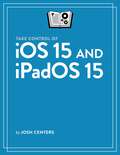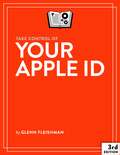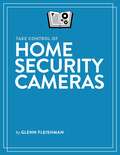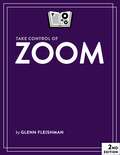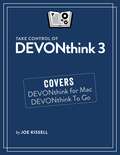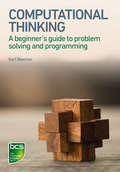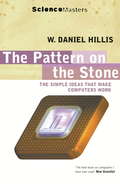- Table View
- List View
The Bleeding Edge: Why Technology Turns Toxic in an Unequal World
by Bob HughesIt’s hammered into us from birth that ‘all good things come at a price’. Today, that price looks apocalyptic, with wars, exploitation and environmental collapse in every part of the globe. Some suggest that the carnage is “a price worth paying” for technological progress. No pain, no gain. But technology is precisely the business of minimising the costs and impacts of existence… and by whole orders of magnitude. By now, all human beings should be leading creative, leisure-filled lives in a pristine world of burgeoning diversity. So how did it go so wrong? In a word, inequality. In The Bleeding Edge, Bob Hughes argues that unequal societies are incapable of using new technologies well. Wherever elites exist, self-preservation decrees that they must take control of new technologies to protect and entrench their status, rather than satisfy people’s needs. Hughes pursues the latest discoveries about the effects of social inequality on human health, into the field of human environmental impact, and traces today’s ecological crisis back to the rise of the world’s first elites, 5,000 years ago. He argues that new technologies have never emerged from elites or from the clash of competitive forces, but from largely voluntary, egalitarian collaborations of the kind that produced the world’s first working computers. Finally, Hughes shows that an egalitarian world is not ‘pie in the sky' but our evolutionary homeland, the glue that holds societies together, and the “cradle of invention” from which all our best ideas emerge. The book concludes: ‘Let’s assume that the commitment to human equality that’s written into the Universal Declaration of Human Rights means exactly what it says, and take it from there.’
Technocreep
by Thomas P. Keenan"Technology is rapidly moving into our bodies," writes cyber expert Keenan, "and this book gives a chilling look ahead into where that road may lead us - on a one way trip to the total surrender of privacy and the commoditization of intimacy." Here is the definitive dissection of privacy-eroding and life-invading technologies, coming at you from governments, corporations, and the person next door.Take, for example, "Girls Around Me": a Russian-made iPhone App that allowed anyone to scan the immediate vicinity for girls and women who checked in on Foursquare and had poorly secured Facebook profiles. It combined this information in a way never intended by the original poster. Going to a Disney theme park? Your creepy new "MagicBand" will alert Minnie Mouse that you're on the way and she'll know your kid's name when you approach her. Thinking about sending your DNA off to Ancestry.com for some "genetic genealogy"? Perhaps you should think again: your genetic information could be used against you.With security scares like the Heartbleed bug (which compromised even supposedly safe internet behemoths like Google and Yahoo!) becoming more commonplace, this book is a must-read for anybody who values their privacy in a wired world.
Learning in Virtual Worlds: Research and Applications
by Barney Dalgarno Belinda Tynan Mark J.W. Lee Sue GregoryThree-dimensional (3D) immersive virtual worlds have been touted as being capable of facilitating highly interactive, engaging, multimodal learning experiences. Much of the evidence gathered to support these claims has been anecdotal but the potential that these environments hold to solve traditional problems in online and technology-mediated education—primarily learner isolation and student disengagement—has resulted in considerable investments in virtual world platforms like Second Life, OpenSimulator, and Open Wonderland by both professors and institutions. To justify this ongoing and sustained investment, institutions and proponents of simulated learning environments must assemble a robust body of evidence that illustrates the most effective use of this powerful learning tool. In this authoritative collection, a team of international experts outline the emerging trends and developments in the use of 3D virtual worlds for teaching and learning. They explore aspects of learner interaction with virtual worlds, such as user wayfinding in Second Life, communication modes and perceived presence, and accessibility issues for elderly or disabled learners. They also examine advanced technologies that hold potential for the enhancement of learner immersion and discuss best practices in the design and implementation of virtual world-based learning interventions and tasks. By evaluating and documenting different methods, approaches, and strategies, the contributors to Learning in Virtual Worlds offer important information and insight to both scholars and practitioners in the field. Contributors include Paul M. Baker, Francesca Bertacchini, Leanne Cameron, Chris Campbell, Helen S. Farley, Laura Fedeli, Sue Gregory, Christopher Hardy, Bob Heller, Vicki Knox, Shailey Minocha, Jessica Pater, Margarita Pérez García, Mike Procter, Torsten Reiners, Paul Resta, Corbin Rose, Miri Shonfeld, Ann Smith, Layla F. Tabatabaie, Assunta Tavernise, Robert L. Todd, Steven Warburton, and Stephany F. Wilkes.
Emergence and Innovation in Digital Learning: Foundations and Applications
by George VeletsianosEducational systems worldwide are facing an enormous shift as a result of sociocultural, political, economic, and technological changes. The technologies and practices that have developed over the last decade have been heralded as opportunities to transform both online and traditional education systems. While proponents of these new ideas often postulate that they have the potential to address the educational problems facing both students and institutions and that they could provide an opportunity to rethink the ways that education is organized and enacted, there is little evidence of emerging technologies and practices in use in online education. Because researchers and practitioners interested in these possibilities often reside in various disciplines and academic departments the sharing and dissemination of their work across often rigid boundaries is a formidable task. Contributors to Emergence and Innovation in Digital Learning include individuals who are shaping the future of online learning with their innovative applications and investigations on the impact of issues such as openness, analytics, MOOCs, and social media. Building on work first published in Emerging Technologies in Distance Education, the contributors to this collection harness the dispersed knowledge in online education to provide a one-stop locale for work on emergent approaches in the field. Their conclusions will influence the adoption and success of these approaches to education and will enable researchers and practitioners to conceptualize, critique, and enhance their understanding of the foundations and applications of new technologies. With contributions by Terry Anderson, R. S. Baker, Angela D. Benson, Amy Collier, Alec Couros, Michael Dowdy, Margaret Edwards, B. J. Eib, Cassidy Hall, Katia Hildebrant, P. S. Inventado, Royce Kimmons, Trey Martindale, Rolin Moe, Beth Perry, Jen Ross, Elizabeth Wellburn, Andrew Whitworth.
An Online Doctorate for Researching Professionals: Program Design, Implementation, and Evaluation (Issues in Distance Education)
by Swapna Kumar Kara DawsonThe interest in and demand for online terminal degress across disciplines by professionals wishing to conduct research and fulfill doctoral degree requirements at a distance is only increasing. But what these programs look like, how they are implemented, and how they might be evaluated are the questions that challenge administrators and pedagogues alike. This book presents a model for a doctoral program that bridges theory, research, and practice and is offered completely or largely online. In their described program model, Kumar and Dawson enable researching professionals to build an online communtiy of inquiry, engage in critical discourse within and across disciplines, learn from and with experts and peers, and generate new knowledge. Their program design is grounded in the theoretical and research foundations of online, adult, and doctoral education, curriculum design and community-building, implementation and evaluation. The authors, who draw on their experience of implementing a similar program at the University of Florida, not only share data collected from students and faculty members but also reflect on lessons learned working on the program in diverse educational contexts. An important guide for program leaders who wish to develop and sustain an online professional doctorate, An Online Doctorate for Researching Professionals will also be a valuable resource for higher education professionals seeking to include e-learning components in existing on-campus doctoral programs.
Assessment Strategies for Online Learning: Engagement and Authenticity (Issues in Distance Education)
by Dianne Conrad Jason OpenoFor many learners assessment conjures up visions of red pens scrawling percentages in the top right-hand corner of exams and feelings of stress, inadequacy, and failure. Although negative student reactions to evaluation have been noted, assessment has provided educational institutions with important information about learning outcomes and the quality of education for many decades. But how accurate is this data and has it informed practice or been fully incorporated into the learning cycle? Conrad and Open argue that the potential in many of the new learning environments to alter and improve assesment has yet to be explored by educators and students. In their investigation of assessment methods and learning approaches, Conrad and Openo aim to explore assessment that engages learners and authentically evaluates education. They insist that moving to new learning environments, specifically those online and at a distance, afford educators opportunities to embrace only the most effective face-to-face assessment methods and to realize the potential of delivering education in the digital age. In this volume practitioners will find not only an indispensable introduction to new forms of assessment but also a number of best practices as described by experienced educators.
25 Years of Ed Tech (Issues in Distance Education)
by Martin WellerIn this lively and approachable volume based on his popular blog series, Martin Weller demonstrates a rich history of innovation and effective implementation of ed tech across higher education. From Bulletin Board Systems to blockchain, Weller follows the trajectory of education by focusing each chapter on a technology, theory, or concept that has influenced each year since 1994. Calling for both caution and enthusiasm, Weller advocates for a critical and research-based approach to new technologies, particularly in light of disinformation, the impact of social media on politics, and data surveillance trends. A concise and necessary retrospective, this book will be valuable to educators, ed tech practitioners, and higher education administrators, as well as students.
Critical Digital Pedagogy in Higher Education (Issues in Distance Education)
by George Veletsianos Chris Rowell Suzan KöseoğluRecent efforts to solve the problems of education—created by neoliberalism in and out of higher education—have centred on the use of technology that promises efficiency, progress tracking, and automation. The editors of this volume argue that using technology in this way reduces learning to a transaction. They ask administrators, instructors, and learning designers to reflect on our relationship with these tools and explore how to cultivate a pedagogy of care in an online environment. With an eye towards identifying different and better possibilities, this collection investigates previously under-examined concepts in the field of digital pedagogy such as shared learning and trust, critical consciousness, change, and hope.
How Education Works: Teaching, Technology, and Technique (Issues in Distance Education)
by Jon DronIn this engaging volume, Jon Dron views education, learning, and teaching through a technological lens that focuses on the parts we play in technologies, from language and pedagogies to computers and regulations. He proposes a new theory of education whereby individuals are not just users but co-participants in technologies— technologies that are intrinsic parts of our cognition, of which we form intrinsic parts, through which we are entangled with one another and the world around us. Dron reframes popular families of educational theory (objectivist, subjectivist, and complexivist) and explains a variety of educational phenomena, including the failure of learning style theories, the nature of literacies, systemic weaknesses in learning management systems, the prevalence of cheating in educational institutions, and the fundamental differences between online and in-person learning. Ultimately, How Education Works articulates how practitioners in education can usefully understand technology, education, and their relationship to improve teaching practice.
Principles of Blended Learning: Shared Metacognition and Communities of Inquiry (Issues in Distance Education)
by D. Randy Garrison Norman D. Vaughan Martha Cleveland-Innes Deborah DellThe rapid migration to remote instruction during the Covid-19 pandemic has expedited the need for more research, expertise, and practical guidelines for online and blended learning. A theoretical grounding of approaches and practices is imperative to support blended learning and sustain change across multiple levels in education organizations, from leadership to classroom. The Community of Inquiry is a valuable framework that regards higher education as both a collaborative and individually constructivist learning experience. The framework considers the interdependent elements of social, cognitive, and teaching presence to create a meaningful learning experience. In this volume, the authors further explore and refine the blended learning principles presented in their first book, Teaching in Blended Learning Environments: Creating and Sustaining Communities of Inquiry, with an added focus on designing, facilitating, and directing collaborative blended learning environments by emphasizing the concept of shared metacognition.
Troubles Online: Critical Approaches to Accessible Teaching and Learning
by Chelsea Temple Jones Fady Shanouda Lisanne BinhammerOnline education is often heralded as a solution for accessibility to higher education; however, ableism thrives online. In this timely collection, contributors aim to trouble what online teaching looks like and think critically about how disability is addressed in online classrooms. Through narratives, poetry, interviews, and scholarly analysis, they reflect on disabled, mad, sick, and crip online pedagogy and highlight the possibilities of expanding critical standards for accessible teaching and learning. Necessarily interdisciplinary, this collection retheorizes the classroom around a justice-based approach to online pedagogy and challenges the assumptions we have around universal design. Refusing to position access as an afterthought, this collection troubles our engagement with online accessibility in uncertain and evolving times.
Feminist Pedagogy for Teaching Online
by Enilda Romero-Hall Jacquelyne Thoni Howard Clare Daniel Niya Bond Liv NewmanInstructors across higher education require inspiring and practical resources for creating, adapting to, and enhancing, online teaching and learning spaces. Faculty need to build collaborative, equitable and trusting online learning communities. This edited volume examines the experiences that interdisciplinary and global feminist educators have had—both their successes and their challenges—in infusing feminist pedagogical tenets into their online teaching and learning practices. Contributors consider how to promote connection, reflexivity, and embodiment; build equity, cooperation, and co-education; and create cultures of care in the online classroom. They also interrogate knowledge production, social inequality, and power. By (re)imagining feminist pedagogy as a much-needed tool and providing practical advice for using digital technology to enact these tenets in the classroom, this collection will empower educators and learners alike.
Suck It In and Smile
by Laurence Beaudoin-MasseA funny, touching look at the life of a social media influencer who starts to question the #goals life she has created for herself. Every day, Ellie motivates her hundreds of thousands of followers to become the best versions of themselves by posting videos of exercise routines and high-protein breakfast recipes. Far from the shy teenager that she was, she is now in a very public relationship with singer Samuel Vanasse, and together they have become one of the most popular influencer couples in the country. She has succeeded. She shines. And yet, Ellie worries that her life is not as flawless as she makes it seem on YouTube and Instagram. Between her obsession with the “ideal weight,” her growing attraction to another man, her family’s disdain for her career as a content creator and a collaboration with another influencer who Ellie can’t stand, a thought haunts her. What if, by trying to become everything she wanted to be, she’s lost herself along the way? Suck it In and Smile is an intimate exploration of our obsession with appearances and the hypocrisies that appear when you must craft the perfect online life. Key Text Features chapters vignettes dialogue
Say Yes and Keep Smiling
by Laurence Beaudoin-MasseIn the highly anticipated sequel to Suck it In and Smile, Ellie is wrestling her picture-perfect life as a social media influencer back under control — but how long can she keep bridging the distance between the desire to be herself and the pressure to conform? Ellie is an inspiration to her hundreds of thousands of followers on Instagram and YouTube. Her book of wellness tips (including her signature recipe for chocolate chip–chickpea cookies) is about to launch. She is one half of a social-media power couple with singer Samuel Vanasse, who is now her fiancé. And she is on the verge of breaking into the top three on the YouTube charts. She has everything she needs to be happy — but lately, when she starts crying, she can’t seem to stop. Between her father’s failing health and the charming yet enigmatic Dave, between her friendship-rivalry with another YouTuber and the pressure to be “authentic” at all times, Ellie is lost. She retreats into her old patterns and tries to regain control of her life, one Fat Burning Challenge at a time. But listening to her heart isn’t as easy — or glamorous — as she’s been making it look to her followers. This exciting conclusion to Ellie’s story examines how we measure success and happiness, while exploring the complexities of body image, female rivalry and grief. Key Text Features chapters vignettes dialogue
Emily Posts
by Tanya Lloyd KyiMiddle school podcast advice columnist + social media influencer wannabe Emily Laurence takes on the principal at her school to stand up for a climate march, in this fun, school-based drama for ages 10 and up. For fans of Gordon Korman and Susin Nielsen.Emily is the ringleader for her school podcast, Cedarview Speaks — Sponsored by CoastFresh! But her plans for middle-school fame and social media influence are derailed when Amelie joins her eighth-grade class. The new arrival has a seemingly endless supply of confidence and a gift for leading people. Or leading them astray, as far as Emily's concerned.Emily puts her old-fashioned sense of etiquette into practice. Rather than confronting Amelie, she focuses her energy on creating a podcast story about an upcoming climate march. But her story is censored by the school principal. When she protests, Emily gets cut from the podcast crew . . . and Amelie takes her place!Can Emily use her influence to spread the news of the climate march, reclaim her place on the podcast team and expose the flaws of CoastFresh? Can she balance her impeccable manners with twenty-first century activism? And how will she ever manage to work alongside Amelie?With a light touch and plenty of humor, Emily Posts explores issues of social media, influence, corporate sponsorship . . . and the fraught waters of middle-school friendship.
Digital Capitalism and its Limits: Technotopia, Power and Risk
by Vishwas SatgarThe Fourth Industrial Revolution (4IR) has been described as the next big leap in digital capitalism. Digital technologies such as artificial intelligence, quantum computing, 3D printing and robotisation, we are led to believe, will bring more progress, growth and development while also helping us to resolve the deep and multiple crises the world is in. Billions are being invested in these technologies, accompanied by sharp geopolitical rivalries to secure an edge in the control over them. Volume 8 in the Democratic Marxism series invites readers to think more deeply and critically about digital capitalism and its limits. While most governments in the world, including South Africa, have accepted a techno-nationalist narrative and have deliberated on the risks for the planet and humanity, the volume interrogates the effects and consequences of advances in artificial intelligence and heightened technological innovation and industrialisation on employment, democracy and the climate. Viewing the grand social engineering of 4IR through a Marxist lens, the volume contributors engage critically with the class project of digital monopoly capitalism and its powerful totalitarian tendencies. They question the dangerous technotopian imaginary shaping this digital techno-shift, the implications of algorithmic data extractivism, the securitisation of already weak market democracies, the social consequences of digital learning, lack of regulation, and the power dynamics in the labour process. Anchored in techno-realism, the interdisciplinary perspective captured in this volume puts forward alternatives for democratisation and a just transition to protect human and non-human life.
Take Control of Audio Hijack
by Kirk McElhearnIn this 143-page book, you'll learn how to use version 4 of Rogue Amoeba's Audio Hijack to capture and enhance any audio coming out of your Mac, whether it's your own voice via a microphone, a streaming radio show in Safari, or audio from a DVD. Audio expert Kirk McElhearn covers a variety of scenarios—including recording Zoom calls, digitizing LPs, and making podcasts—and provides a bonus chapter about editing your recordings in Rogue Amoeba's Fission audio editor.
Take Control of iOS 15 and iPadOS 15
by Josh CentersYour iPhone, iPod touch, or iPad gain all new features and interface changes with iOS 15 and iPadOS 15. In Take Control of iOS 15 and iPadOS 15 by TidBITS Managing Editor Josh Centers, you'll learn what's new and how to get more out of your Apple mobile devices with these operating systems.
Take Control of Your Apple ID
by Glenn FleishmanThis book covers everything someone needs to know about configuring an Apple ID account, interactions with iCloud-based services, and troubleshooting account access.
Take Control of Find My and AirTags
by Glenn FleishmanTake Control of Find My and AirTags takes you inside Apple’s Find My ecosystem. Once a way to track the whereabouts of your iPhone by having it ping the internet at regular intervals, now Find My encompasses sharing and following people (with permission), much of Apple’s hardware and some Beats audio gear, and new trackers from Apple and third parties (including the AirTag). This book helps you understand how it all fits together, and how to keep yourself safe by preventing, identifying, and blocking unwanted tracking.
Take Control of Home Security Cameras
by Glenn FleishmanLearn everything you need to know about home security cameras to plan, purchase, and install the best system for your needs for live access, security monitoring, privacy concerns, and affordability.
Take Control of Zoom
by Glenn FleishmanThis book explains how to use the Zoom videoconferencing service from start to finish. It offers detailed instructions, warnings, and tips from installing and configuration of Zoom software, through set up and participation, and how to host meetings.
Take Control of DEVONthink 3
by Joe KissellDEVONthink 3 offers a slew of features for defeating information overload, but mastering its power is easier with real-world advice from DEVONthink power user Joe Kissell. He helps you understand the best ways to put information into DEVONthink and how to organize it so you can find it later. He also covers syncing DEVONthink databases among your Apple devices and using DEVONthink To Go in iOS.
Computational Thinking: A Beginner's Guide to Problem-Solving and Programming
by Karl BeecherComputational thinking is a timeless, transferable skill that enables you to think more clearly and logically, as well as a way to solve specific problems. <p><p> Beginning with the core ideas of computational thinking, with this book you'll build up an understanding of the practical problem-solving approach and explore how computational thinking aids good practice in programming, complete with a full guided example.
The Pattern On The Stone: The Simple Ideas That Make Computers Work (SCIENCE MASTERS)
by Daniel HillisWill computers become thinking machines? A scientist at the cutting-edge of current research gives his provocative analysis.The world was shocked when a computer, Deep Blue defeated Gary Kasparov, arguably the greatest human chess player ever to have lived. This remarkable victory, and other, more day-to-day innovations, beg serious questions: what are the limits of what computers can do? Can they think? Do they learn?Discussions of these questions tend to get muddled because most people have only the vaguest idea of how computers actually work. This book explains the inner workings of computers in a way that does not require a profound knowledge of mathematics nor an understanding of electrical engineering. Starting with an account of how computers are built and why they work, W. Daniel Hillis describes what they can and cannot do - at the present time - before explaining how a computer can surpass its programmer and, finally, where humanity has reached in its quest for a true Thinking Machine.
